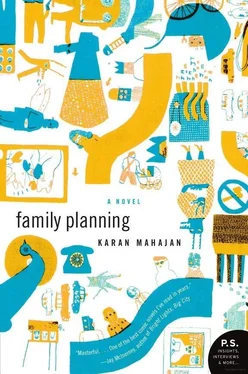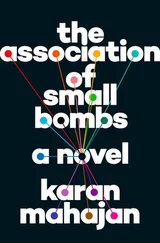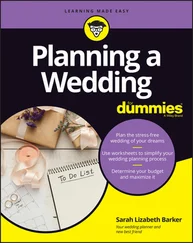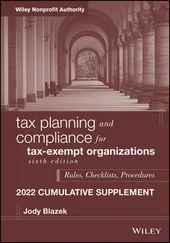This, against all odds, he could learn to respect.
Now the question that remained — the question that could alter completely his idea of how many years it was possible to lead a double life, to lie, to get away with risks that came with a certified Adult license — was this: Who was the horny one? Mama or Papa?
He spat out a phlegmy jet into the sink.
Arjun found Sangita sitting glumly in the nursery with a newspaper. She was wearing her stiff gray sari.
“He died,” she said, offering no context. “He was here one minute and then — phut — just like that, gone.”
“Oh no, I’m so sorry, Mama,” said Arjun, looking sad. “I don’t think I knew — him. Who was it?”
“Such a nice man he was. Gave tea-shee to his workers for no reason. Used to donate so much to the charities. All the tires you see the poor boys on the road playing with, he gave them. Such few nice men these days.”
“I’m sorry to hear that,” said Arjun. “When is the cremation?”
She said, “What cremation, bhai, they don’t even give him the honor of that these days, such little time.”
“He was a Muslim?”
“Arre, why so many questions? Are you not watching? How can he be Muslim and going to the temple for charity? Do you know any Muslims who give to charity?”
“No,” Arjun admitted.
“And do you know of a Muslim woman who runs a company?”
“Was he murdered?” asked Arjun. “Usually if the cause of death is unknown then they need the body and do tests to see…”
“He died because of using cell-o-phone in the tub,” she said, sighing. “But it was not his fault, naa. They killed him.”
“ They? Was this in the papers?”
“Zee-TV, naah, who else.”
Arjun was dumbfounded. He returned to his room.
Rita was giggling in the hallway. “Yaar, it’s Mohan Bedi from The Vengeful Daughter-in-Law . I think his contract finished, so they, you know, killed him off. He was everyone’s favorite, so God knows why they killed him. So nice, so charming, so elegant, so handsome, so fair, so talented, so husband-y, chho chweet…”
ARJUN SHOULD HAVE KNOWN this is how he would make peace with Mama — offering condolences for the death of a TV character. Having done the needful, he was ready to ask his siblings for a favor. A favor about the concert. This was no easy task, Arjun knew. Firstly, it was two thirty on a weekday, a time of hunger; Papa would be home soon. Secondly, the house was a calamity in suspension. The house was the riots of 1947, the children massacring one another with a calm disrespect for personal boundaries. Or, at other times, as Mama liked to say, the house was the Agra Mad House. Or as Papa liked to qualify: on fire. No amount of analogizing or eulogizing could suffice, however. A family of thirteen in modern-day India was a disaster, a game of marbles that had lost its marbles, a giddy Titanic aching for its eventual iceberg, a pack of wolves with no Mowgli to raise, a team of jihadis so bored they’d declared holy war on one another.
As Mama had one day said, “What are these Americans constantly complaining about, every day here is a September 11 only!”
She had said, or shouted, this with special reference to a series of kamikaze paper-planes that had struck the warring pixels of the TV screen one bright Sunday morning, disrupting the eight o’clock Bhajans Sangita liked to watch.
Varun, his hands still nimble from wing-folding, screamed from the drawing room, “MAMA, SAHIL CALLED YOU OSAMAMA!”
But Sahil was innocent and sitting silently. On a sofa. In pajamas. With a fried egg on his lap. Which was not supposed to be in his lap but rather on a plate that was now fallen on the ground.
Sahil screamed, “MAMA, I DIDN’T! SHANKAR, GET THE TOWEL! VARUN IS MOCKING ME!”
Tanya put aside her Harry Potter and intervened. “Arre, Varun what has Sahil done to you? Why are you bullying him?”
Varun was indignant. “He called Mama a bad name.”
“But he didn’t,” Tanya yawned. “ You did.”
“You said Mama’s Osama!” said Sahil, furiously dabbing his egg-soaked knee with a piece of toast and slurping up the yolk.
Varun wasn’t impressed. “So? It’s funny, no? When have you ever cracked a joke?”
“But Varun — I mean, bhaiya—” Bhaiya was the respectful term for elder brother.
“You called me Varun ?” Varun thundered. “Is my name Varun or Bhaiya ? What, you see this?” This referred to Varun’s balled fist. Of course.
And so Sahil learned. He had not flown the planes but he had to take the blame. The family was run on a system of mafioso respect, a constant tangle of snakes and ladders where the older you were, the longer you could rattle your tail and shake up the kiddies shinnying up the stepping-stool of experience. But being a wily old snake also had its disadvantages. It meant you couldn’t ask for favors without coiling around yourself, tying yourself into a knot that could take years to disentangle.
Arjun understood that asking for a favor would mean years of sibling servitude, a debt that would be paid out in tiny pounds of flesh — flesh that was completely unnecessary since, ostensibly, one had the same flesh as one’s siblings. And that is what made it so much worse. It was flesh for flesh’s sake.
But a family shouldn’t be run on a system of favors, an earnest voice inside Arjun said. Everyone should favor everyone.
What a delusion! The only time such delusions were even remotely true was on Diwali or Holi or Rakhi or Indo-Pak cricket matches, festivals that were contingent on the collective. For a day, each enmity or plot of revenge would be buried and a terrifying fealty would take over. Terrifying because it was so vicious. You hit my brother with a water balloon? Well, I hit you with ten thousand! You buy a ten-thousand-explosions firecracker to scare my little sister? I throw a water balloon on it too ! Plus! Plus I buy a one-trillion firecracker, one that you will hear till the day you die!
Arjun was a part of this family too. He knew how it worked and he knew he would encounter resistance, rubbing the match-head of his request against the rough responses of his siblings. Each one would require a separate strategy of appeasement. For instance, he would have to forgive Varun for his transgressions, his reckless cricketing in the backyard and the gulley behind the house. The austere shape of a cricket ball whizzing through the air would cause a gallop of heartbeats in the Ahuja household. And, occasionally, the cracking of a windshield. But Arjun had caught Varun at his worst, most humbling moment — when he had smashed the ball straight into Shankar the servant’s brand-new Atlas bicycle, rupturing the spokes of its back wheel. The poor servant had wept, not knowing the cause of the damage. He had bought the bicycle with his own money (he had insisted to Rakesh that he wanted to be self-made) and was looking forward to cycling on it with his cell-phone cocked against his ear (this he had accepted from Rakesh on the condition that he would pay off the cost of the phone with cuts from his salary). But now the wheel would crack like a rib each time he perched on the seat. Varun had been characteristically cruel to cover up his misdoing. Each time he saw Shankar’s five-foot frame hunched over the wheel, he would say, “What? You’ve started thinking of yourself as Gandhi-ji spinning the wheel or what? Are you going to make clothes from it by sitting there only?”
Varun didn’t know that Arjun had witnessed the entire event from the window, that Arjun had given Shankar money for the repair from his own pocket-money. Shankar had refused. “I’ll get the sister-fucker who did this. He thinks he can come outside the minister’s house and smash up his bicycle.”
Читать дальше












